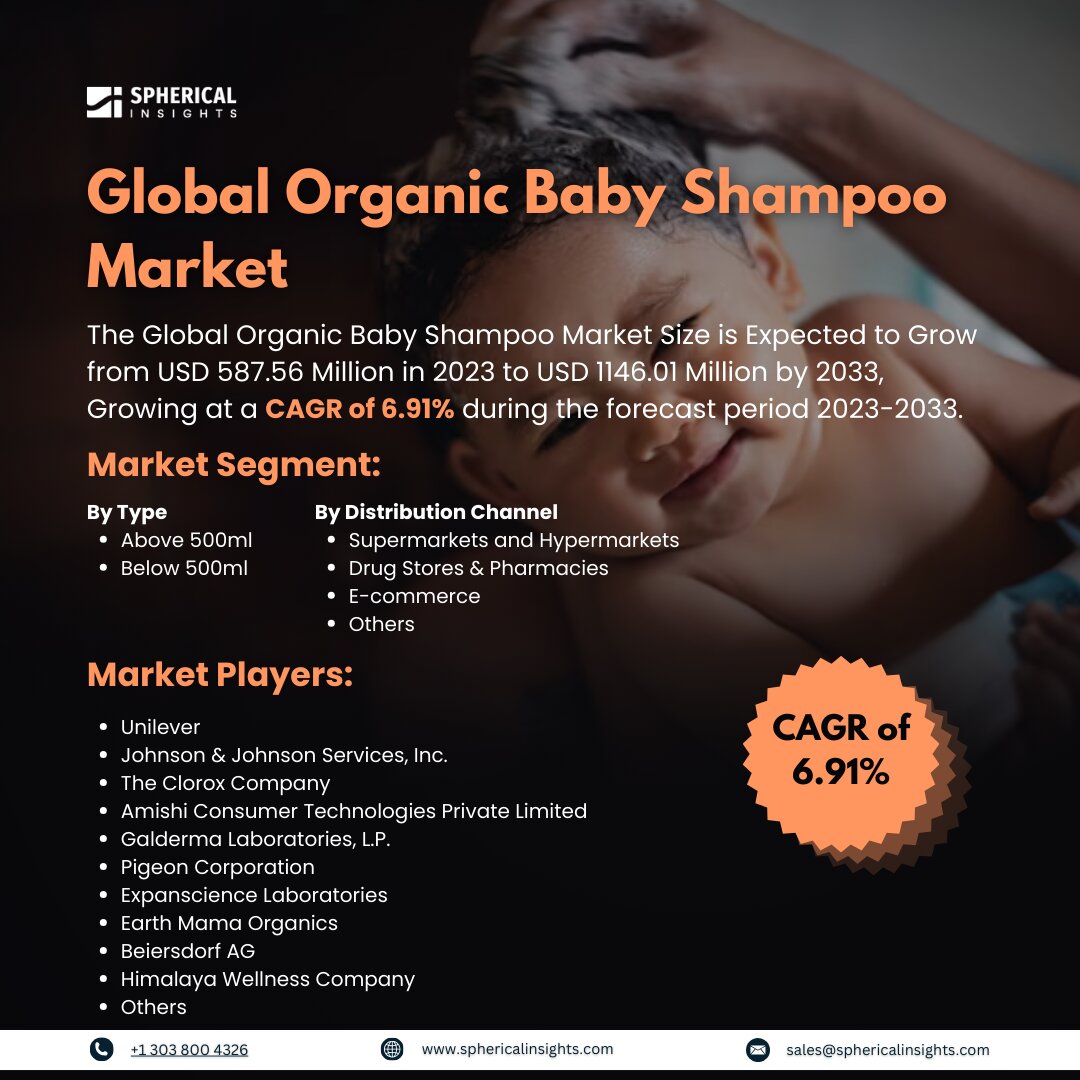Global Organic Baby Shampoo Market Size to Worth USD 1146.01 Million by 2033
According to a research report published by Spherical Insights & Consulting, the Global Organic Baby Shampoo Market Size is Expected to Grow from USD 587.56 Million in 2023 to USD 1146.01 Million by 2033, Growing at a CAGR of 6.91% during the forecast period 2023-2033.
Browse key industry insights spread across 215 pages with 110 Market data tables and figures & charts from the report on the Global Organic Baby Shampoo Market Size, Share, and COVID-19 Impact Analysis, By Type (Above 500ml and Below 500ml), By Distribution Channel (Supermarkets and Hypermarkets, Drug Stores & Pharmacies, E-commerce, and Others), and By Region (North America, Europe, Asia-Pacific, Latin America, Middle East, and Africa), Analysis and Forecast 2023 – 2033.
An organic baby shampoo is a hair care solution aimed to remove pollutants, oils, dirt, skin particles, dandruff, and other contaminants that build on a baby's scalp over time. Plant-based shampoo is preferred by parents. The use of organic baby goods has grown significantly among parents who seek to protect their infants from the negative effects of the artificial chemicals included in conventional products. Common components in these products include phthalates, parabens, sulfates, and artificial scents, all of which can irritate the skin and lead to various health issues. A growing number of parents are choosing organic baby shampoos, which are made with natural, non-toxic components and are typically devoid of chemicals and preservatives, as they become understanding of the potentially negative consequences of these ingredients. This has led to encouraging growth in the organic baby shampoo market. Chamomile, coconut oil, organic raw honey, and several other organic oils that are beneficial to the baby's skin and scalp are among the natural and organic ingredients included in organic baby shampoo. An excellent substitute for synthetic baby shampoo is organic shampoo, which is sulfate-free. No allergic response or negative skin effects are caused by organic baby shampoo. However, the market has challenges, especially with organic baby shampoo's high price, which may prevent some customers from purchasing it.
The below 500ml segment is expected to hold a significant market share of the global organic baby shampoo market through the forecast period.
Based on the type, the organic baby shampoo market is categorized into above 500ml and below 500ml. Among these, the below 500ml segment is expected to hold a significant market share of the global organic baby shampoo market through the forecast period. Since children's hair requires minimal shampoo, parents generally agree to use an organic baby shampoo that is less than 500 ml in volume. About packaging and delivery, sachet shampoos are also significantly more economical. Enhancements in product innovation and a growing trend of introducing organic or natural goods with a capacity of less than 500 ml also help to boost sales of organic baby shampoo. As a result, it is anticipated that these factors will propel segment expansion throughout the projection period.
The supermarkets and hypermarkets segment is estimated to hold the highest market share of the global organic baby shampoo market through the forecast period.
Based on the distribution channel, the organic baby shampoo market is divided into supermarkets and hypermarkets, drug stores & pharmacies, e-commerce, and others. Among these, the supermarkets and hypermarkets segment is estimated to hold the highest market share of the global organic baby shampoo market through the forecast period. Supermarket and hypermarket sales of these products have increased dramatically due to rising customer demand for natural and organic items, especially in the baby care sector. Since these retail channels provide excellent accessibility, convenience, and competitive pricing, they are effective in reaching a larger consumer base. Supermarkets and hypermarkets cater to modern parents who are conscious of the negative effects of chemical-based baby care products by carrying a large assortment of products, including organic baby shampoos. A sizable section of this population favors shopping at these establishments due to their confidence in the availability of high-quality, safe products.
North America is expected to hold the largest share of the organic baby shampoo market through the forecast period.
North America is expected to hold the largest share of the organic baby shampoo market through the forecast period. The region's growing demand for organic baby shampoo is a result of changing consumer preferences toward sustainability, safety, and wellness. Parents are increasingly looking for natural, non-toxic alternatives for baby care products, which is a particularly apparent trend in the US and Canada. In these economies, a growing percentage of millennial parents are tech-savvy and well-informed about the substances in products. These parents are more inclined to look into and select goods that support their principles, such as cruelty-free, eco-friendly, and organic goods. There are also significant growth opportunities for the regional market in the well-established e-commerce sector.
Asia Pacific is predicted to grow at the fastest CAGR of the organic baby shampoo market over the forecast period. Urbanization, rising levels of disposable income, and growing knowledge of wellness and health trends are all factors contributing to the region's sizable and diversified population. Organic baby shampoos are among the high-end products that consumers are ready to spend more on when their disposable incomes rise, especially in developing regional markets such as China and India. With the fast growth of the middle class in these economies, parents are more willing to spend money on better, safer, and more environmentally friendly products for their kids. Additionally, regional governments are driving market participants to introduce safe and chemical-free products by enforcing stricter rules on product sourcing and consumption across several industries.
Competitive Analysis
Major key players in the organic baby shampoo market include Unilever, Johnson & Johnson Services, Inc., The Clorox Company, Amishi Consumer Technologies Private Limited, Galderma laboratories, L.P., Pigeon Corporation, Expanscience Laboratories, Earth Mama Organics, Beiersdorf AG, Himalaya Wellness Company, and others.
Recent Developments
- In October 2024, Mothercare plc, a manufacturer of products for parents and young children, announced that it has formed a joint venture (JV) with Reliance Brands Holding UK Limited (RBL UK), a subsidiary of Reliance Brands Limited. The agreement states that RBL UK will control the majority of the Mothercare brand and its intellectual property (IP) assets in the markets in Bangladesh, India, Bhutan, Sri Lanka, and Nepal. In these areas, maintaining brand consistency and maximizing consumer interaction would fall under the purview of the new business.
Key Target Audience
- Market Players
- Investors
- End-users
- Government Authorities
- Consulting And Research Firm
- Venture capitalists
- Value-Added Resellers (VARs)
Market Segment
This study forecasts revenue at global, regional, and country levels from 2023 to 2033. Spherical Insights has segmented the organic baby shampoo market based on the below-mentioned segments:
Global Organic Baby Shampoo Market, By Type
Global Organic Baby Shampoo Market, By Distribution Channel
- Supermarkets and Hypermarkets
- Drug Stores & Pharmacies
- E-commerce
- Others
Global Organic Baby Shampoo Market, By Regional Analysis
- North America
- Europe
- Germany
- UK
- France
- Italy
- Spain
- Russia
- Rest of Europe
- Asia Pacific
- China
- Japan
- India
- South Korea
- Australia
- Rest of Asia Pacific
- South America
- Brazil
- Argentina
- Rest of South America
- Middle East & Africa
- UAE
- Saudi Arabia
- Qatar
- South Africa
- Rest of the Middle East & Africa



